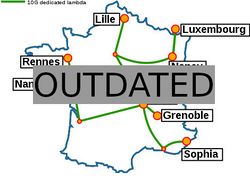Grid5000:Home
|
Grid'5000 is a large-scale and versatile testbed for experiment-driven research in all areas of computer science, with a focus on parallel and distributed computing including Cloud, HPC and Big Data. Key features:
Older documents:
|
Random pick of publications
Five random publications that benefited from Grid'5000 (at least 2517 overall):
- Igor Fontana de Nardin, Patricia Stolf, Stéphane Caux. Evaluation of Heuristics to Manage a Data Center Under Power Constraints. 13th International Green and Sustainable Computing Conference (IGSC 2022), Oct 2022, Pullman, United States. 10.1109/IGSC55832.2022.9969362. hal-03841713 view on HAL pdf
- Wedan Emmanuel Gnibga, Anne Blavette, Anne-Cécile Orgerie. Renewable Energy in Data Centers: the Dilemma of Electrical Grid Dependency and Autonomy Costs. IEEE Transactions on Sustainable Computing, 2023, pp.1-13. 10.1109/TSUSC.2023.3307790. hal-04189173 view on HAL pdf
- Ajinkya Kulkarni. Expressivity transfer in deep learning based text-to-speech synthesis. Machine Learning cs.LG. Université de Lorraine, 2022. English. NNT : 2022LORR0122. tel-03844914 view on HAL pdf
- Nicolas Zampieri, Carlos Ramisch, Irina Illina, Dominique Fohr. Identification of Multiword Expressions in Tweets for Hate Speech Detection. LREC 2022 - 13th Edition of its Language Resources and Evaluation Conference, Jun 2022, Marseille, France. hal-03676508 view on HAL pdf
- Gustavo A Salazar-Gomez. Transformer-based Lidar-RGB Fusion for Semantic Grid Prediction in Autonomous Vehicles. Computer Vision and Pattern Recognition cs.CV. 2022. hal-03943226 view on HAL pdf
Latest news
Failed to load RSS feed from https://www.grid5000.fr/mediawiki/index.php?title=News&action=feed&feed=atom: Error parsing XML for RSS
Grid'5000 sites
Current funding
As from June 2008, Inria is the main contributor to Grid'5000 funding.
INRIA |
CNRS |
UniversitiesUniversité Grenoble Alpes, Grenoble INP |
Regional councilsAquitaine |


